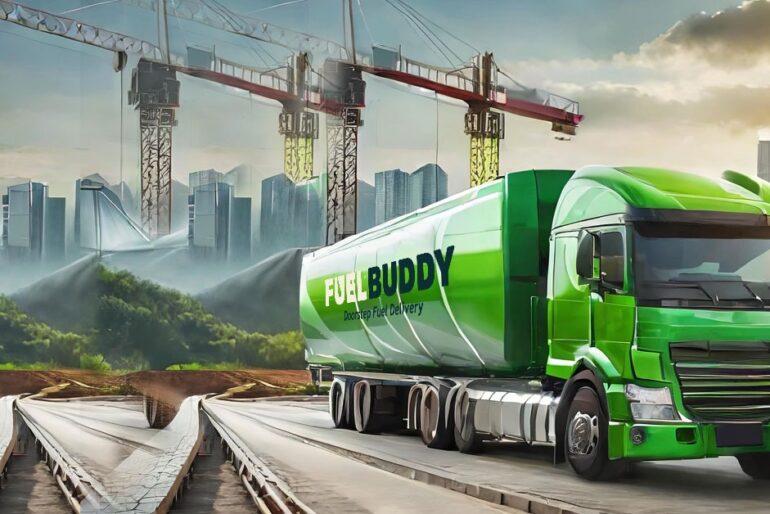As industries across the globe continue to evolve, the logistics of diesel fuel delivery must adapt to meet new demands and challenges. Innovations in technology, sustainability, and efficiency are driving significant changes in the fuel delivery industry. This article explores the future trends shaping fuel logistics and their potential impact on businesses relying on diesel delivery.
Technological Advancements in Fuel Delivery
IoT Integration
The Internet of Things (IoT) is revolutionizing fuel delivery logistics by enhancing connectivity and real-time monitoring capabilities.
- Smart Sensors: IoT-enabled sensors monitor fuel levels, quality, and temperature, providing real-time data to fleet managers.
- Remote Monitoring: IoT allows for remote monitoring of fuel tanks and delivery trucks, ensuring timely refills and reducing the risk of shortages.
Automation and AI
Automation and artificial intelligence (AI) are key drivers of efficiency and accuracy in fuel delivery logistics.
- Automated Ordering: AI algorithms predict fuel needs based on historical data and usage patterns, automating the ordering process.
- Route Optimization: AI-powered route optimization software ensures the most efficient delivery routes, reducing travel time and fuel consumption.
Blockchain Technology
Blockchain technology offers enhanced security and transparency for fuel delivery transactions.
- Secure Transactions: Blockchain ensures that all fuel transactions are secure and immutable, reducing the risk of fraud and discrepancies.
- Transparent Tracking: Every step of the fuel delivery process is recorded on the blockchain, providing a transparent and verifiable log of activities.
Sustainability and Environmental Impact
Renewable Fuels
The shift towards renewable fuels is gaining momentum as businesses seek to reduce their carbon footprint and comply with environmental regulations.
- Biofuels: Derived from organic materials, biofuels offer a sustainable alternative to traditional diesel, producing fewer emissions.
- Synthetic Fuels: Chemically engineered fuels provide high efficiency and lower environmental impact compared to conventional diesel.
Eco-Friendly Delivery Practices
Adopting eco-friendly practices in fuel delivery logistics helps reduce the environmental impact of transportation.
- Electric Delivery Vehicles: The use of electric delivery trucks reduces greenhouse gas emissions and lowers operational costs.
- Efficient Routing: Optimizing delivery routes minimizes fuel consumption and emissions, contributing to a greener logistics process.
Emissions Monitoring
Advanced monitoring systems help businesses track and manage their emissions, ensuring compliance with environmental standards.
- Real-Time Data: Continuous monitoring of emissions provides real-time data, allowing for immediate corrective actions if needed.
- Regulatory Compliance: Detailed emissions reports help businesses demonstrate compliance with environmental regulations and sustainability goals.
Enhancing Efficiency in Fuel Logistics
Predictive Maintenance
Predictive maintenance uses data analytics to foresee and prevent potential issues with delivery vehicles and equipment.
- Data-Driven Insights: Analyzing data from sensors and telemetry systems predicts when maintenance is needed, preventing breakdowns.
- Reduced Downtime: Proactive maintenance reduces downtime, ensuring continuous and efficient fuel delivery operations.
Advanced Fuel Management Systems
Fuel management systems integrate various technologies to optimize fuel usage and inventory management.
- Real-Time Monitoring: Continuous monitoring of fuel levels and consumption ensures optimal usage and prevents shortages.
- Inventory Optimization: Advanced systems help manage fuel inventory more efficiently, reducing waste and operational costs.
Fleet Management Integration
Integrating fuel delivery logistics with fleet management systems enhances overall efficiency and coordination.
- Unified Platform: A unified platform allows fleet managers to monitor and manage all aspects of fuel delivery and vehicle performance from a single interface.
- Data Synchronization: Synchronizing data between fuel delivery and fleet management systems provides a comprehensive view of operations, improving decision-making.
Improving Customer Experience
Personalized Services
Offering personalized fuel delivery services enhances customer satisfaction and loyalty.
- Customized Scheduling: Flexible delivery schedules tailored to customer needs ensure timely and convenient fuel supply.
- Dedicated Support: Providing dedicated customer support helps address any issues promptly and ensures a smooth delivery experience.
Transparency and Communication
Transparency and effective communication are crucial for building trust and maintaining strong customer relationships.
- Real-Time Updates: Providing real-time updates on delivery status and expected arrival times keeps customers informed and reduces uncertainty.
- Feedback Mechanisms: Implementing feedback mechanisms allows customers to share their experiences and helps improve service quality.
Value-Added Services
Offering value-added services can differentiate fuel delivery providers and enhance customer satisfaction.
- Fuel Quality Testing: Providing regular fuel quality testing ensures customers receive high-quality fuel, maintaining engine performance and longevity.
- Consultation Services: Offering consultation services on fuel management and efficiency helps customers optimize their operations and reduce costs.
Adapting to Market Changes
Regulatory Changes
Staying ahead of regulatory changes is essential for maintaining compliance and avoiding penalties.
- Proactive Compliance: Regularly reviewing and updating compliance practices ensures adherence to new regulations.
- Industry Standards: Keeping abreast of industry standards and best practices helps businesses stay competitive and compliant.
Market Dynamics
Adapting to market dynamics and customer demands is crucial for long-term success in the fuel delivery industry.
- Customer Preferences: Understanding and anticipating customer preferences allows businesses to tailor their services and meet evolving needs.
- Competitive Pricing: Offering competitive pricing while maintaining high service quality helps attract and retain customers in a dynamic market.
Technological Innovation
Continuous innovation in technology is key to staying competitive and efficient in the fuel delivery industry.
- Investment in R&D: Investing in research and development drives innovation and helps businesses stay ahead of technological advancements.
- Adopting New Technologies: Embracing new technologies and integrating them into operations enhances efficiency and service quality.
Conclusion
The future of fuel logistics is being shaped by technological advancements, sustainability initiatives, and a focus on efficiency and customer experience. By leveraging innovations such as IoT, AI, and blockchain, businesses can optimize their fuel delivery processes, reduce environmental impact, and enhance customer satisfaction. For those looking to stay competitive in the evolving fuel delivery industry, exploring advanced solutions like those offered by T&R Oil Co can provide the necessary tools and expertise to achieve operational excellence and sustainability.


